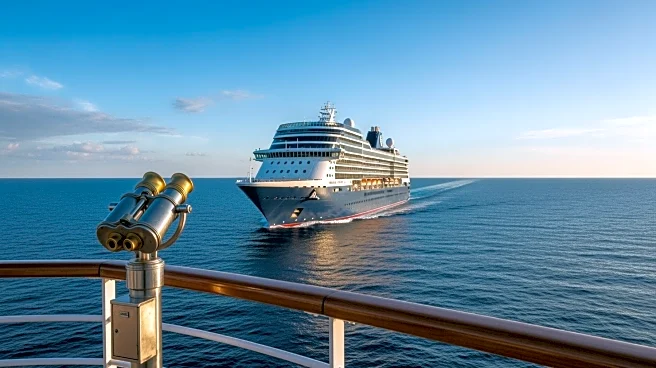What's Happening?
The cruise industry is set to experience a significant boom in 2026, with projections indicating a record-breaking year for passenger volumes. According to AAA, 21.7 million Americans are expected to embark
on ocean cruises, marking a 4.5% increase from 2025. This growth is attributed to the increasing popularity of cruises among U.S. travelers, driven by the appeal of diverse destinations, convenience, and the value offered by cruise vacations. The Caribbean remains the most popular destination, capturing 72% of U.S. cruise passengers, followed by Alaska and the Mediterranean. The rise of mega vessels, particularly in the Caribbean, Mediterranean, and Northern Europe, has contributed to this trend, offering extensive amenities that attract a wide range of travelers.
Why It's Important?
The projected growth in the cruise industry highlights a significant shift in travel preferences among Americans, with cruises offering an all-inclusive vacation experience that appeals to various demographics. This trend is likely to have a substantial impact on the travel and tourism sectors, boosting economic activity in regions popular with cruise passengers. The high satisfaction rates among cruise-goers, with 90% rating their experiences as very good or good, suggest a strong potential for repeat business and further growth. The increase in cruise passengers also underscores the importance of the cruise industry as a key player in the broader travel market, influencing travel patterns and economic outcomes in destination regions.
What's Next?
As the cruise industry prepares for this anticipated growth, stakeholders are likely to focus on expanding capacity and enhancing offerings to meet the rising demand. Travel agencies and cruise lines may increase marketing efforts to attract new customers and retain existing ones. Additionally, the industry may face challenges related to environmental sustainability and regulatory compliance, prompting potential innovations in ship design and operations. The economic impact on popular cruise destinations could lead to increased investment in infrastructure and services to accommodate the influx of tourists.
Beyond the Headlines
The growth of the cruise industry may also raise ethical and environmental concerns, particularly regarding the impact of large vessels on marine ecosystems and coastal communities. As the industry expands, there may be increased scrutiny from environmental groups and regulatory bodies, potentially leading to stricter regulations and sustainability initiatives. The industry's response to these challenges could shape its long-term viability and reputation, influencing consumer perceptions and travel choices.









